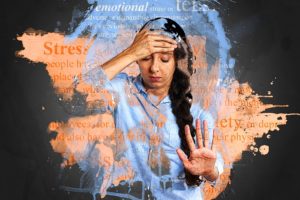Symptoms in chronic hyperventilation

The pH value (acidity) in the body changes due to chronic hyperventilation. This causes a number of unwanted symptoms.
- It provides a continuous narrowing of the blood vessels. As a result, the organs do not get enough oxygen. In particular the brain is highly impacted by the oxygen deficiency. This can amount to about 30 to 40%. The result is a continuous light feeling in the head. People often feel like being able to faint every moment. The squeezing of the blood vessels also causes cold hands and feet.
- The red blood cells cannot deliver their oxygen properly to the tissues in the alkaline environment. This creates a continuous and sometimes even extreme feeling of tiredness.
- The muscle cells produce lactic acid in an effort to restore the pH value. The consequences are muscle aches, trembling or sometimes even cramping muscles. Also pain in the chest can be caused by this.
- An altered metabolism and an increased release of histamines often produce allergic reactions.
- Often there is an increased heart rate. This is due to the increased adrenaline level in the blood. Then this again gives rise to panic and anxiety.
The body and its processes are therefore considerably disrupted in this alkaline state. The patient becomes anxious because of the symptoms. The increased anxiety level creates more adrenaline. And as a result, the respiratory center is further stimulated to increase the breathing frequency. This can lead to a vicious circle, in which the patient eventually gets a hyperventilation attack – also known as an anxiety and panic attack.
The complete list of symptoms

in chronic hyperventilation
The hyperventilation syndrome often causes various symptoms in people. Some are stronger in one person than in others. But most people suffering from chronic hyperventilation usually recognize themselves in the list of symptoms below. The following phenomena are – almost without exception – present to a greater or lesser extent:
- Changing degree of fatigue / lethargy.
- Hypersensitivity to stimuli from the environment, irritability with respect to daily obligations “I want to, but I can not.”
- Sleep disorders.
- Concentration and memory disorders.
- Trembling.
- Increased perspiration, heat surges.
- (Claustro-) phobic elements, fear of dying, panic feelings.
- Light, insecure, unpleasant feeling in the head (dizziness).
- Tightness, gasping fro air.
- Fear of fainting, fear of going crazy or fear of losing control.
- Heart pounding
- Pain, tightness in the chest, that radiates out to one or both arms.
- Blurred vision, hearing sounds from afar.
- Insecure legs.
- Cold or tantalizing hands and feet.
- Digestive problems.
The symptoms cause phobic phenomena
These symptoms mainly occur in certain situations. They therefore cause phobic phenomena. Some patients wake up with the symptoms at night. Others get them when they sit quietly in front of the TV after a period of activities. The majority experiences these phenomena in the following situations:
- A store full of people.
- The queue for a cash register in the supermarket.
- Full trams or buses.
- Lifts and in tunnels.
- In crowded cinemas and theaters.

 the respiratory center
the respiratory center diagnosis chronic hyperventilation
diagnosis chronic hyperventilation